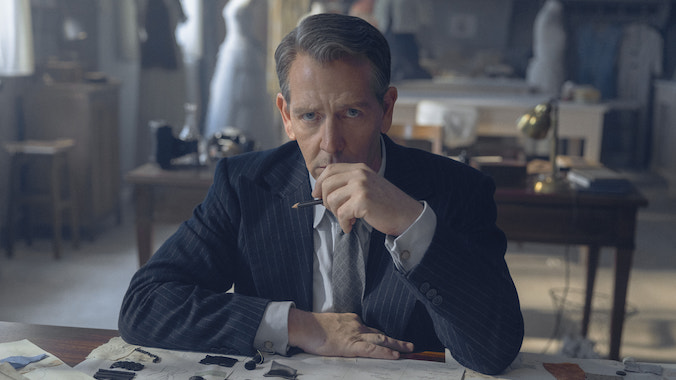Apple TV+’s The New Look Highlights the Beauty of Creation Alongside the Horrors of War
Photo Courtesy of Apple TV+
“White. A blank page or canvas. His favorite. So many possibilities.”
That quote is from Stephen Sondheim’s Sunday in the Park with George, a musical about tormented painter Georges Seurat. Though Apple TV+’s new series The New Look has nothing to do with Seurat, this quote—about the act of creating art—is equally applicable here. The New Look, from showrunner Todd A. Kessler, centers on an entirely different Frenchman: the perdurable Christian Dior. Hearing his name may conjure images of his numerous designs, but the man himself is somewhat inscrutable and has not been extensively explored on screen until now.
The first of the 10 episodes (all of which were available for review) introduce us to an established Dior in 1955, played by an understated Ben Mendelsohn. It has been seven years since he launched his first collection that made him a household name in the world of couture. And, in the words of his contemporary Coco Chanel (Juliette Binoche), he is a nervous wreck. Tortured and superstitious, he is obsessed with tarot readings and can no longer enjoy the success he worked so hard to achieve.
We then flash back to 1943, where Dior is navigating the German occupation of his city of Paris during the final years of World War II. This war has forced him and his employer Lucien Lelong (a kindly and soft-spoken John Malkovich) to make an impossible choice: design dresses for Nazi wives and girlfriends or remain out of work. No work is not an option, of course, and so Dior takes the “don’t ask, don’t tell” approach to his clientele. Dior also supports his sister Catherine (Maisie Williams), a revolutionary who is an active part of the French Resistance.
Alongside the story of Dior, The New Look tells the adjacent narrative of Coco Chanel during the same period. Though their journeys and behaviors rarely overlap, their circumstances are more alike than it appears at first glance. Beloved members from both of their families are captured by Nazi’s; Catherine is taken to a concentration camp where she is mercilessly tortured by the Germans in order to extract information about her Resistance colleagues. Chanel’s nephew Joseph is also taken and, with the help of a man with Nazi connections, she works to get him released—with a price: she must provide assistance to the Germans.
In her performance, Binoche emphasizes the contradictions, selfishness, and complete impossibility of being Coco Chanel. She is self-centered, yet she cares deeply for her nephew, who is the only true family she has. Her constant battles are with herself, though she takes her frustrations out on everybody around her, including her lifelong confidant Elsa Lombardi (Emily Mortimer). Binoche’s nuanced performance alternates between making us root for her and hate her, sometimes within the same episode.
-

-

-

-

-

-

-

-

-

-

-

-

-

-

-

-

-

-

-

-

-

-

-

-

-

-

-

-

-

-

-

-

-

-

-

-

-

-

-

-








































